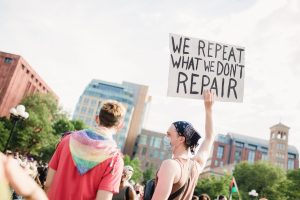The Adult Industry’s Reckoning on Race Has Arrived
 As #BlackLivesMatter protests around America and the world continue, multiple industries are taking a hard look at their treatment of race—and adult entertainment is no exception. Over the past few weeks, many production studios, performers, and even agencies have begun examining, and in many cases reforming, the industry’s systemic racist practices.
As #BlackLivesMatter protests around America and the world continue, multiple industries are taking a hard look at their treatment of race—and adult entertainment is no exception. Over the past few weeks, many production studios, performers, and even agencies have begun examining, and in many cases reforming, the industry’s systemic racist practices.
Brazzers tweeted in late May in response to growing protests over the murder of George Floyd, “To all our black talent, members, colleagues, and fans – we stand with you.” And performer Kristi Marxx responded, “Cool! Thanks. We would love for y’all to diversify your talent and shoot more black women.”
The same day, when Vixen wrote that they “acknowledge the ongoing struggle of…the black community and we heed the call to show support for the movement,” performer Lasha Lane fired back, “Start by hiring more black models instead of just tweeting perhaps…Same 5 Black women on rotation in Porn is getting tired.”
When male performer Ricky Johnson weighed in the next day with an in-depth thread that broke down his experience with racism in his career, it went viral, and other performers began to detail their own experiences. And, wrote Jezebel’s Tracy Clark-Flory, “The conversation quickly moved beyond Johnson’s popular thread, as performers deconstructed industry-wide racism, from white performers’ racism to race-based pay disparities and racist film tropes.”
Cool! Thanks. We would love for y’all to diversify your talent and shoot more black women.
— BLM ✊🏾✨ (@KristiMaxx) May 31, 2020
Ana Foxx, one of the industry’s most prominent Black female performers, talked with Rolling Stone’s EJ Dickson about the race-related problems she has faced in her career. “There aren’t that many roles [for black women],” she said. “I can’t tell you how many times I’ve heard, ‘Ana, we wish we could shoot you more, but we only shoot so many black girls.’” The reason? Because, according to the producers Foxx talked to, “black female performers do not sell as well as white female performers.” But, Foxx said, that’s a chicken-and-egg dilemma. “How do you expect black women to ever do more than ‘move the needle’ if you don’t give us opportunities to work?”
Start by hiring more black models instead of just tweeting perhaps.
No disrespect to my girls @thekiranoir and @AnaFoxxx and the other young lady who just popped up, but come on… Same 5 Black women on rotation in Porn is getting tired.
— Lasha Lane (@LashaLane) May 31, 2020
The roles that are made available to performers of color are often with the few studios that regularly shoot Black content, which are notorious for trotting out well-worn and offensive, degrading, and outright racist stereotypes. For instance, Ana Foxx told Rolling Stone that in the early days of her work in porn, she “appeared in a scene in which she was asked to give oral sex to white men wearing Confederate flag T-shirts,” while Ricky Johnson reported that “he did a scene where the director asked the black performers to wear prison uniforms, and asked if he was comfortable with the white female performer using the n-word on set. (He said no.)”
And then there’s interracial.
A category of pornography that pairs almost exclusively white female talent with Black male talent—and can earn white women “anywhere from one-and-a-half to 10 times the typical “boy-girl” rate of $1,000, which is to say: between $1,500 and $10,000,” according to an anonymous agent who spoke with Jezebel. Meanwhile, the Black men in the scenes do not get paid more for their work. Nor do Black women in the porn industry have the opportunity to earn similar rates for any of their “first-time” experiences on camera. The practice, wrote EJ Dickson at Rolling Stone, “[creates] a deeply uncomfortable racial economic hierarchy that’s perpetuated by performers’ agents, who take a commission off these higher rates.”
The adult industry has a large amount of racism In it. People of color don’t have a voice. Women of color especially. You ever been told by a director “I can’t put you in this movie because it’s not an IR movie”.
— Ricky Johnson (@yearofthericky) June 1, 2020
“Porn is the only industry where you can justify your racism,” Isiah Maxwell told Rolling Stone. “You can’t force anyone to have sex with anyone they don’t want to—you can’t say, ‘You have to fuck a black guy to be in this industry’—so you can justify your beliefs” about race.
All of this has been going on for decades, despite the repeated protests of performers of color within the industry. and is considered “how things are done.” But, wrote EJ Dickson, “many in the industry see the conversation kickstarted by the Black Lives Matter protests as a prime opportunity to get prominent companies to change many of their problematic practices.”
And, so far, it’s working. Conversations are happening around the industry in a big way—and in public. Round table discussions, interactive Zoom meetings, social media conversations, and big-name feature articles in prominent publications are all happening. And the industry’s movers and shakers are taking notice.
AVN, perhaps the adult industry’s most venerable publication and award-granting body, announced the discontinuation of the terms “interracial” and “IR” in its media coverage, along with the removal of the “interracial” and “ethnic” categories from the AVN Awards. Shortly thereafter, Blacked’s Mike Moz told Rolling Stone that the company would stop using “BBC” and “interracial” in marketing copy, and would “would cast more black women and write more inclusive storylines, though he defended the practice of offering higher rates for white performers doing their first scenes with black men.”
And a coalition of industry talent agencies—including AMA Modeling, Ideal Image Models, Motley Models, and Spiegler Girls—have banded together to vow to “to implement a united policy regarding Talent Rate disparity associated with any Talent receiving a higher or lower rate of pay, due to the color of a person’s skin, race, ethnicity, religion or creed.” Given that it’s often the agents who encourage their white female performers to “hold out” for more money for their first interracial scene, this move is particularly important.
This reckoning has been a long time coming. Black performers have been calling out these racist practices for decades—from Lexington Steele’s notorious interview with Roots to Ana Foxx’s post-AVN call out in 2017. But, Mireille Miller-Young, a professor of feminist studies at University of California, Santa Barbara and author of A Taste for Brown Sugar: Black Women in Pornography told Jezebel, performers who spoke out have historically been “met with massive resistance and silencing tactics.”
Right now, it looks like that pattern may finally be changing. And we hope it continues to get better.
Photo of woman holding sign at protest by Life Matters from Pexels













